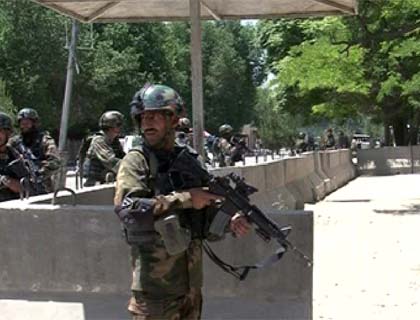Few days ago, President Barack Obama announced serious concern over the so-called growing “green on blue” incidents. He said that he would discuss the issue with Afghan officials and try his best to solve the problem. He also hoped that close cooperation with Afghan political and military officials would prove effective in prevention of such attacks in the future.
He expressed concern amidst growing attacks on foreign security forces by individuals in uniform. During past sixth months, more than 25 such attacks have been carried out, which have left more than thirty dead and numerous injured. Perhaps, the casualty caused by individuals in uniform to NATO soldiers is far larger than dealt by Taliban militants. Generally, three reasons are mentioned for the cause of such attacks:
1) infiltration of Taliban and Al-Qaeda elements to Afghan security establishment; 2) psychological problems and 3) personal problem with foreign security forces.
In the first case, no doubt, Taliban leaders have always claimed to be behind such attacks. They claim responsibility after each and every attacks operated by people in the uniform which have already proved deadly for foreign security forces as well as grim future for the country. The frequency and continuity of the attacks reveal that Taliban sympathizers are not less among Afghan security establishments.
Those who turn up and open fire against Afghan or foreign fellows, are indeed the core elements. Suicide bombers do not care about their lives. Because they are certainly aware of the consequences of their attacks and likely understand that they wouldn’t make out alive, but still they turn weapons and shoot their foreign fellows. Perhaps, the only thing always nudges their minds is that when to find opportunity to carry out attacks with maximum possible casualties.
Definitely, all militants are not ready to die for the cause; however, they all notice the possibility that anytime they might get killed, fighting Afghan Security forces and foreign allies. But if the situation alters in a way that dead becomes certain, only a minority will remain around Mullah Omar and the rest of course will defect.
Those who remain they are the core and key player in the establishment, not of Taliban but in any organization. However, military officials emphasize that the recruitment process is tight enough to sieve away Taliban elements but considering some incidents in which Taliban infiltrators were vividly involved portrays that the process is completely porous. Perhaps, it is rarely possible that a person filled an application to become a police be rejected. Even those who were Taliban fighters are easily recruited in security forces. See for instance, the earlier defection of 12 Afghan police in the south who rejoined Taliban. So, it is hard to accept that the process of recruitment is transparent and preventive.
Previously, I have written about the issue and explained how the procedure of recruitment, nepotism, ethno-centrism and other forms of corruption have helped militants to easily get into. Here once again I want to highlight that the very policy of communal representation and invisible hands of officials in the process of recruitment are the two main factors that paves way for infiltration. Moreover, the ethnic sentiments still dominate the national sentiments. It has been a question for me how Taliban infiltrators remain unnoticed for a long time. It is possible the his fellows may identify him as sympathizers of Taliban but still avoid to report due to mere communal sentiment.
The second issue is the psychological problem. Usually, those who are economically in a better situation wouldn’t go or allow their family members to join police ranks instead poor and excluded families join it in order to earn something to survive. Because, being a cop in Afghanistan is deemed quite difficult that is not comparable with amount of salary they are paid. Particularly, in the restive areas, police are exposed to maximum danger. Meanwhile, the salary is not more than ten thousand Afghanis which is not enticing at all for anyone.
Those who join police came mostly from lower layers of the society. Therefore, on one hand their salary range is too low, and, on the other hand, some are the only breadwinners for their households. Such economic pressure and risk they take on daily basis are the principle reasons for pushing them up-normal. Unable to deal with such psychological pressure, they sometimes display vicious scenarios like assassination of foreign fellows.
The third reason for green on blue attacks is personal problem. However, I should notice that I do not have any evidence denoting on sensitive behavior of foreign security forces, but there are propaganda circulating around of humiliating treatment of Afghan civilians. Discussing about the current situation, a friend was puttering with angry tone of voice about house search in southern parts of the country.
He was saying that NATO forces several times attacked houses and killed people right beside their wives. In such cases, anti-foreign sentiments are fuelled because Afghans are generally very sensitive to what is called “namus” (honor).
There are also verbal clashes reported among Afghan and foreign security forces over minor issues which unfortunately ends to lethal consequences. The above three reasons generally counted but there are other reasons like lack of cordial concept of foreign allies, the issue of ethno-centrism within the security establishments and etc. which I will deal with in a separate article.

